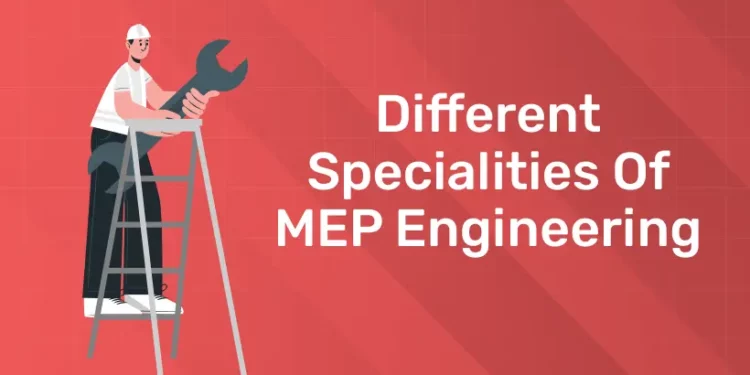Table of Contents
The different specializations that make up MEP engineering are essential to building design. Every specialization is essential to designing practical and effective environments, from HVAC (heating, ventilation, and air conditioning) systems that guarantee interior comfort to lighting schemes that improve the visual experience. MEP engineering now includes plumbing systems as a specialty. Plumbing systems are necessary for waste collection and water delivery. And last, fire protection systems, which include smoke control, sprinkler systems, and fire alarms, are made to protect buildings and the people who live in them. When designing buildings to achieve maximum functionality, comfort, safety, and energy efficiency, it is crucial to understand these many MEP engineering domains. In this article we are examinig different specializations of MEP Engineering in detail.
Get Career oriented MEP training with Expert Mentors! Get Free Demo Here!
Different Specialities of MEP Engineering
HVAC Engineering
A vital component of MEP engineering, HVAC engineering is concerned with controlling temperature, humidity, and air quality to create comfortable interior spaces. It entails the design and upkeep of HVAC, ventilation, air conditioning, and control systems while taking into account the size, occupancy, temperature, and energy efficiency needs of the structure. Additionally, HVAC experts make sure that all building rules and regulations are followed.
Electrical Engineering
Low-voltage systems, comprising structured cabling, network infrastructure, access control, surveillance, and audio/video distribution systems, are designed by engineers. These systems include communication, data, security, and audiovisual systems.
Plumbing Engineering
Designing and maintaining plumbing systems in buildings is the focus of plumbing engineering, a critical MEP engineering specialty. Optimizing performance and efficiency necessitates taking into account many parameters such as water pressure, flow rates, pipe sizing, and fixture selection. Furthermore, plumbing experts evaluate the state of the infrastructure and suggest ways to boost efficiency and performance when remodeling and upgrading already-existing systems.
Fire Protection Engineering
The design and implementation of systems for the prevention, detection, and control of building fires falls under the critical domain of fire protection engineering in MEP engineering. Fire alarms, sprinkler systems, smoke control systems, and suppression systems are some of its components. To evaluate fire threats, create plans, and adhere to fire laws and standards, fire protection engineers work in conjunction with architects, owners, and stakeholders. These systems support occupant and building safety.
Lighting Design Engineering
Planning and implementing lighting systems in buildings is the focus of lighting design, a critical MEP engineering specialization. It impacts occupant experience, comfort, and functionality by improving a building’s aesthetics and ambiance. To develop well-balanced lighting schemes, designers work in tandem with electrical engineers, interior designers, and architects. By utilizing daylight harvesting strategies, energy-efficient fixtures, and the integration of natural lighting sources, lighting design encourages energy conservation.
Sustainable Design
Sustainable design engineers use green building technology and principles into MEP systems to reduce environmental impact and optimize resource efficiency. In order to obtain LEED certification for green buildings, engineers with experience in the LEED certification process help with the design and documentation of MEP systems.
Commissioning And Building Performance
Engineers carry out commissioning procedures to guarantee that MEP systems are installed, tested, and run in compliance with performance standards and design intent. Engineers use energy modeling and computer simulations to assess building performance and optimize MEP systems for occupant comfort, indoor environmental quality, and energy efficiency.
Conclusion
MEP engineers are at the front of innovation in a field that is changing quickly. They incorporate cutting-edge controls, energy modeling, and building information modeling (BIM) to push the limits of efficiency and design. MEP engineers are a key player in creating the resilient and sustainable buildings of the future because they are always adjusting to new norms, regulations, and environmental demands. A fulfilling specialization in MEP engineering is available to individuals who are passionate about building safe, effective, and sustainable built environments that have a long-lasting effect on the communities they serve.
Master MEP Design with Industry-Leading Training!
Gain in-depth knowledge of Mechanical, Electrical, and Plumbing (MEP) Design with expert-led courses. Learn HVAC, fire safety, sustainable building strategies, and BIM applications to excel in the construction industry.
Know MoreMEP Course By Entri
One of Entri’s upskilling courses, MEP Design, is especially intended for engineers who want to succeed in their careers. It truly is appropriate for people who desire a well-paying position both domestically and overseas. The “MEP Design Course” offers thorough training and direction, going above and beyond typical academic learning. It gives students the abilities and information needed to succeed in the fast-paced world of MEP design. Students can use their newly learned skills in real-world circumstances through this priceless opportunity, which improves their comprehension and employability.
MEP training with Expert Mentors! Get Free Demo Here!
|
Engineering Upskilling Courses
|
| MEP Course |
| BIM Course |
| Quantity Surveyor Course |
| Structural Design Course |
| MEP QS Course |
Master MEP Design with Industry-Leading Training!
Gain in-depth knowledge of Mechanical, Electrical, and Plumbing (MEP) Design with expert-led courses. Learn HVAC, fire safety, sustainable building strategies, and BIM applications to excel in the construction industry.
Know MoreFrequently Asked Questions
Why is MEP engineering important in construction?
Construction requires MEP engineering because MEP systems are necessary for a building’s functionality, safety, and comfort. MEP engineers make ensuring that structures have effective fire safety systems, dependable electricity distribution, clean water supplies, enough lighting, and heating and cooling systems.
What is the difference between MEP and HVAC engineering?
HVAC engineering is concentrated on heating, ventilation, and air conditioning systems, whereas MEP engineering covers mechanical, electrical, and plumbing systems. Although the phrases are frequently used interchangeably in practice, HVAC engineering is a subset of MEP engineering.
How do MEP engineers ensure the safety of building occupants?
MEP engineers create and specify fire safety systems, such as emergency lighting, smoke detectors, sprinklers, and fire alarms, to protect building inhabitants in the case of a fire or other emergency. In addition, they create systems that guard against exposure to dangerous contaminants and preserve indoor air quality.










